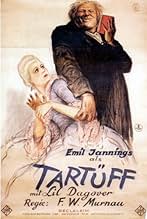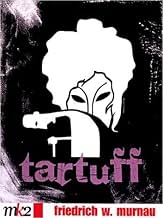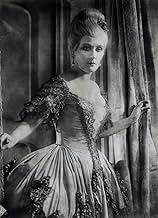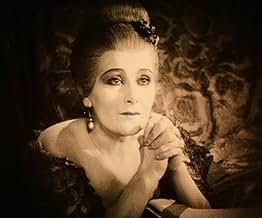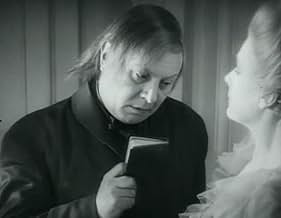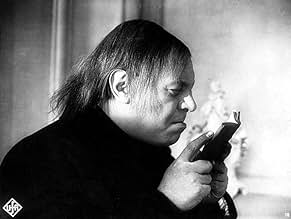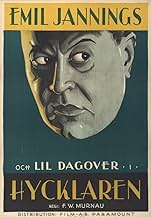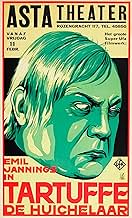VALUTAZIONE IMDb
7,1/10
2872
LA TUA VALUTAZIONE
Aggiungi una trama nella tua linguaA young man shows his millionaire grandfather a film based on Molière's Tartuffe, in order to expose the old man's hypocritical governess who covets his own inheritance.A young man shows his millionaire grandfather a film based on Molière's Tartuffe, in order to expose the old man's hypocritical governess who covets his own inheritance.A young man shows his millionaire grandfather a film based on Molière's Tartuffe, in order to expose the old man's hypocritical governess who covets his own inheritance.
- Regia
- Sceneggiatura
- Star
Recensioni in evidenza
While this film does not have the amazing scenes with breathtaking cinematography like FAUST or SUNRISE, this Murnau film still does excel due to the camera-work and great care taken in its production. And, while not the very best silent film available, it's certainly among the better ones.
This story differs from Molière's play in that the entire play is actually part of a larger story--with a prologue and epilogue. The story begins with a rich old man living alone with his supposedly devoted housekeeper. She has convinced the man that his grandson is evil and should be disinherited because he is, oh, horrors,...an ACTOR!!! Instead, she's fooled him into making her the beneficiary. When the grandson shows up to say hello, the old man chases him away and it appears the housekeeper has won. However, given that the young man is an actor, he dresses up as a traveling showman and comes to the house to show them a film--TARTUFFE.
The film stars Emil Jannings as the evil priest, Tartuffe, who has fooled a rich nobleman into forsaking the pleasures of life and becoming an aesthetic, like him. But, the man's wife soon realizes the priest is a charlatan and much of the movie is spent trying to trap the priest in his lies. Naturally, all this is symbolic of the relationship between the housekeeper and the rich man.
The sets, direction and acting are all excellent. The acting is rather restrained compared to some silent films and the story is told in a brisk and watchable manner.
This story differs from Molière's play in that the entire play is actually part of a larger story--with a prologue and epilogue. The story begins with a rich old man living alone with his supposedly devoted housekeeper. She has convinced the man that his grandson is evil and should be disinherited because he is, oh, horrors,...an ACTOR!!! Instead, she's fooled him into making her the beneficiary. When the grandson shows up to say hello, the old man chases him away and it appears the housekeeper has won. However, given that the young man is an actor, he dresses up as a traveling showman and comes to the house to show them a film--TARTUFFE.
The film stars Emil Jannings as the evil priest, Tartuffe, who has fooled a rich nobleman into forsaking the pleasures of life and becoming an aesthetic, like him. But, the man's wife soon realizes the priest is a charlatan and much of the movie is spent trying to trap the priest in his lies. Naturally, all this is symbolic of the relationship between the housekeeper and the rich man.
The sets, direction and acting are all excellent. The acting is rather restrained compared to some silent films and the story is told in a brisk and watchable manner.
This is the fourth Murnau i've seen, after Nosferatu, Sunrise and Faust. I admire the work of Murnau for it's beautiful compositions an camera movement. Murnau is able to translate the mood he want's to set into composition and movement without being artsy for the sake of it.
Tartuffe has quiet a story behind it. Apparently, Murnau was forced by contract to make this film. So this film is to Murnau what Spartacus was to Kubrick. Even though it's still a Murnau picture: again Murnau knows how to give a quiet flat story more depth by suggestion and style. I liked the film, it's hasn't got the outdoors scene's that Sunrise and Nosferatu had, or the huge sets and special effect of Faust, but still it remains an exciting film. Don't hold back by the negative reviewers of the film, this is, by all means, not a bad film. It's just that Murnau made so much breathtaking stuff in his other work, that this film seems not so historical interesting. But if you're a fan of Murnau's other work I'm sure you'll like this as well. Make sure you'll watch the Masters of Cinema edition. It has a great documentary about the making of this film. It gave me a lot of new insights about the film and about Murnau.
Tartuffe has quiet a story behind it. Apparently, Murnau was forced by contract to make this film. So this film is to Murnau what Spartacus was to Kubrick. Even though it's still a Murnau picture: again Murnau knows how to give a quiet flat story more depth by suggestion and style. I liked the film, it's hasn't got the outdoors scene's that Sunrise and Nosferatu had, or the huge sets and special effect of Faust, but still it remains an exciting film. Don't hold back by the negative reviewers of the film, this is, by all means, not a bad film. It's just that Murnau made so much breathtaking stuff in his other work, that this film seems not so historical interesting. But if you're a fan of Murnau's other work I'm sure you'll like this as well. Make sure you'll watch the Masters of Cinema edition. It has a great documentary about the making of this film. It gave me a lot of new insights about the film and about Murnau.
A wealthy, elderly man is being taken care of by an evil housekeeper who is working to be the heir to his fortune. While she navigates her plan, she is slowly poisoning him. Along comes his disowned grandson, an actor, who sees through the housekeeper's plans. He sets up a movie version of Moliere's Tartuffe, which is about a man who blindly follows a charlatan, Tartuffe, who is working to become heir to a fortune as well. The Tartuffe film is slow moving and has trouble getting around to the climax, but it's still interesting. Not Murnau's best, but worth a look.
Personally I think the other reviewers have been way too hard on this film, and I certainly don't agree that it is "extremely average", "throwaway" or "plain and forgettable". OK - it's not his best by a long shot, but Murnau was such a talented directer/artist that even his weaker films urinate all over the films of most other directors. I thought that the 'film within a film' structure of it worked brilliantly. The cast were all excellent in their acting. The film is pretty great visually too (as one would expect from Murnau) - the 'outer' film is shot in a crisp, modernist style, with adventurous camera angles and no make up, while the central 'film within a film' section was filmed in a more classical, soft-focus style. The film was also quite risky for it's time in its depiction of sexuality, and corruption within the clergy, and several scenes were censored for American audiences.
The central theme of the film is hypocrisy, particularly with those who are overly pious, judgemental and puritanical. This is encapsulated in the words of Tartuffe when he admits: "Who sins in secret - does not sin". Murnau expertly exposes the true roots of fanatically pious behaviour - behind which lies its very opposite. This is very similar to what Freud termed 'reaction formation', whereby a character trait or impulse which one finds unbearable to oneself (the ego) is disguised and repressed by bringing a complete opposite tendency to the facade of ones personality - but this is always noticeable by its exaggeration. The Tartuffe character also indulges in another Freudian defence mechanism called 'projection', whereby one relieves the anxiety caused by an unwelcome trait by projecting it onto others.
It's important to mention that this film also works brilliantly as a satire, and at times I found myself laughing out loud at the grotesque character of Tartuffe. In one scene the obedient Emile is seen rocking Tartuffe as he yawns and lazes in a hammock like a selfish baby. Yet despite the ridiculing, there is always a deep humane concern underlying the film - as there is with all of Murnau's films.
So, like I said: this is not one of his best, but any Murnau film is worth seeing.
The central theme of the film is hypocrisy, particularly with those who are overly pious, judgemental and puritanical. This is encapsulated in the words of Tartuffe when he admits: "Who sins in secret - does not sin". Murnau expertly exposes the true roots of fanatically pious behaviour - behind which lies its very opposite. This is very similar to what Freud termed 'reaction formation', whereby a character trait or impulse which one finds unbearable to oneself (the ego) is disguised and repressed by bringing a complete opposite tendency to the facade of ones personality - but this is always noticeable by its exaggeration. The Tartuffe character also indulges in another Freudian defence mechanism called 'projection', whereby one relieves the anxiety caused by an unwelcome trait by projecting it onto others.
It's important to mention that this film also works brilliantly as a satire, and at times I found myself laughing out loud at the grotesque character of Tartuffe. In one scene the obedient Emile is seen rocking Tartuffe as he yawns and lazes in a hammock like a selfish baby. Yet despite the ridiculing, there is always a deep humane concern underlying the film - as there is with all of Murnau's films.
So, like I said: this is not one of his best, but any Murnau film is worth seeing.
In 1992, an Italian TV channel showed a two-week late-night retrospective of Silent films, the bulk of which were expressionist classics. Unfortunately, I missed out on a couple of these and TARTUFFE was among them. More than a decade had to pass before I could watch it, by which time I had come to consider Murnau - despite the fact that only a small portion of his work has survived the ravages of time - as one of the undisputed masters of cinema.
For some reason, TARTUFFE has been little-seen over the years so that it never had much of a reputation (which may explain why I by-passed its sole TV showing to begin with!); having watched the film now, it clearly emerges as a masterwork from the golden age of German cinema and its place in Murnau's irreproachable canon (still impressive 75 years after the director's untimely death!) should not be overlooked.
Having watched OTHELLO (1922) - which also starred Emil Jannings and Werner Krauss - relatively recently, I couldn't help noticing that it offers an interesting role-reversal with Murnau's film for these two powerhouse actors; in fact, Jannings' larger-than-life performance here is played alongside an impressively restrained turn from Krauss (whom I had previously only seen essaying villainous characters). One of TARTUFFE's most interesting elements is its 'film-within-a-film' structure that looks back to THE CABINET OF DR. CALIGARI (1919; featuring Krauss's most famous role, interestingly enough) and forward to Hiroshi Teshigahara's THE FACE OF ANOTHER (1966) - which, coincidentally, I watched the very next day (my review of which is shortly to follow) without having prior knowledge of this! Criticized at the time for being a pointless flourish on the film-makers' part, I strongly feel that - with respect to TARTUFFE, at least - this device merely underlines the universality of the main theme being dealt with. I see, however, a third connection at play here, this time with Murnau's own NOSFERATU (1922): Tartuffe is presented as a different form of bloodsucker, one who is not undead but very much alive (or human, if you like), and just as dangerous - not to mention that much more common in our daily life than the vampire of myth and literature; besides, the fact that - as in NOSFERATU - here it is the devoted wife of the man under the influence of Moliere's symbolic figure of hypocrisy ("From now on, all hypocrites shall be called 'Tartuffe'!" reads a subtitle) who brings about his come-uppance, by 'sacrificing' herself, only helps reinforce this particular aspect.
Despite the film's relative brevity (explained in my notes for the accompanying documentary below), its intimate nature, and also the fact that Murnau was handed the project at short notice, his trademark stylistics of expressionistic lighting and acrobatic camera-work are well in evidence. Finally, I would like to say something about the English subtitles - displayed over the original German intertitles - for all three of "Masters Of Cinema"'s Silent releases (the others being, of course, SPIONE [1928] and ASPHALT [1929]): I admire Eureka/MoC's decision to preserve authenticity in every aspect of their DVDs, but the interweaving text (with the English translation appearing in too small a font) makes it a comparatively labored read overall! At this juncture, I truly regret missing out on the retrospective of Murnau's work shown a few years back at London's National Film Theatre - and I can only long for the time I will be able to watch the likes of JOURNEY INTO THE NIGHT (1921), THE HAUNTED CASTLE (1921; when I was in Hollywood I held in my hands a DVD-R of this film but, since it had been announced for DVD release by Image, I didn't rent it), THE BURNING SOIL (1922), PHANTOM (1922; the same comments for THE HAUNTED CASTLE apply here, its DVD release from Flicker Alley has been imminent for some time now!), THE GRAND DUKE'S FINANCES (1924) and CITY GIRL (1930). It's inconceivable how the work of such an important film-maker, so long as it is available, is kept mysteriously under wraps - thus denying film buffs everywhere the opportunity of enjoying it!
The 41-minute documentary, TARTUFFE: THE LOST FILM (2004; TV), is an essential watch for fans of Silent films and director F. W. Murnau: although TARTUFFE may not be among Murnau's greatest films, it is certainly one of his most personal as he identified himself with the young relative who is shunned from his inheritance because he has chosen the lowbrow way of the artist rather than a more lucrative profession. Besides, the documentary highlights the depressing state of most Silent films in existence today: while we should consider ourselves lucky that the U.S. theatrical version of TARTUFFE (from which the DVD transfer was made) is in such a good state, it is considerably shorter than the original German version. Fragments of the lost scenes shown in the documentary include a couple of key sequences which, as incomplete as they are in the film now, seem a little rushed. Although the quality is understandably inferior, one wonders why they weren't included in the main feature itself.
For some reason, TARTUFFE has been little-seen over the years so that it never had much of a reputation (which may explain why I by-passed its sole TV showing to begin with!); having watched the film now, it clearly emerges as a masterwork from the golden age of German cinema and its place in Murnau's irreproachable canon (still impressive 75 years after the director's untimely death!) should not be overlooked.
Having watched OTHELLO (1922) - which also starred Emil Jannings and Werner Krauss - relatively recently, I couldn't help noticing that it offers an interesting role-reversal with Murnau's film for these two powerhouse actors; in fact, Jannings' larger-than-life performance here is played alongside an impressively restrained turn from Krauss (whom I had previously only seen essaying villainous characters). One of TARTUFFE's most interesting elements is its 'film-within-a-film' structure that looks back to THE CABINET OF DR. CALIGARI (1919; featuring Krauss's most famous role, interestingly enough) and forward to Hiroshi Teshigahara's THE FACE OF ANOTHER (1966) - which, coincidentally, I watched the very next day (my review of which is shortly to follow) without having prior knowledge of this! Criticized at the time for being a pointless flourish on the film-makers' part, I strongly feel that - with respect to TARTUFFE, at least - this device merely underlines the universality of the main theme being dealt with. I see, however, a third connection at play here, this time with Murnau's own NOSFERATU (1922): Tartuffe is presented as a different form of bloodsucker, one who is not undead but very much alive (or human, if you like), and just as dangerous - not to mention that much more common in our daily life than the vampire of myth and literature; besides, the fact that - as in NOSFERATU - here it is the devoted wife of the man under the influence of Moliere's symbolic figure of hypocrisy ("From now on, all hypocrites shall be called 'Tartuffe'!" reads a subtitle) who brings about his come-uppance, by 'sacrificing' herself, only helps reinforce this particular aspect.
Despite the film's relative brevity (explained in my notes for the accompanying documentary below), its intimate nature, and also the fact that Murnau was handed the project at short notice, his trademark stylistics of expressionistic lighting and acrobatic camera-work are well in evidence. Finally, I would like to say something about the English subtitles - displayed over the original German intertitles - for all three of "Masters Of Cinema"'s Silent releases (the others being, of course, SPIONE [1928] and ASPHALT [1929]): I admire Eureka/MoC's decision to preserve authenticity in every aspect of their DVDs, but the interweaving text (with the English translation appearing in too small a font) makes it a comparatively labored read overall! At this juncture, I truly regret missing out on the retrospective of Murnau's work shown a few years back at London's National Film Theatre - and I can only long for the time I will be able to watch the likes of JOURNEY INTO THE NIGHT (1921), THE HAUNTED CASTLE (1921; when I was in Hollywood I held in my hands a DVD-R of this film but, since it had been announced for DVD release by Image, I didn't rent it), THE BURNING SOIL (1922), PHANTOM (1922; the same comments for THE HAUNTED CASTLE apply here, its DVD release from Flicker Alley has been imminent for some time now!), THE GRAND DUKE'S FINANCES (1924) and CITY GIRL (1930). It's inconceivable how the work of such an important film-maker, so long as it is available, is kept mysteriously under wraps - thus denying film buffs everywhere the opportunity of enjoying it!
The 41-minute documentary, TARTUFFE: THE LOST FILM (2004; TV), is an essential watch for fans of Silent films and director F. W. Murnau: although TARTUFFE may not be among Murnau's greatest films, it is certainly one of his most personal as he identified himself with the young relative who is shunned from his inheritance because he has chosen the lowbrow way of the artist rather than a more lucrative profession. Besides, the documentary highlights the depressing state of most Silent films in existence today: while we should consider ourselves lucky that the U.S. theatrical version of TARTUFFE (from which the DVD transfer was made) is in such a good state, it is considerably shorter than the original German version. Fragments of the lost scenes shown in the documentary include a couple of key sequences which, as incomplete as they are in the film now, seem a little rushed. Although the quality is understandably inferior, one wonders why they weren't included in the main feature itself.
Lo sapevi?
- QuizCamilla Horn served as Lil Dagover's foot double in this film. This small role effectively launched her lengthy acting career, as she was noticed by director F.W. Murnau and cast as the lead actress in his film, Faust (1926).
- Versioni alternativeThis film was published in Italy in an DVD anthology entitled "Il castello di Vogelod", distributed by DNA Srl. The film has been re-edited with the contribution of the film history scholar Riccardo Cusin . This version is also available in streaming on some platforms.
- ConnessioniFeatured in Dämonische Leinwand - Der deutsche Film der zwanziger Jahre (1998)
I più visti
Accedi per valutare e creare un elenco di titoli salvati per ottenere consigli personalizzati
Dettagli
- Tempo di esecuzione
- 1h 14min(74 min)
- Colore
- Mix di suoni
- Proporzioni
- 1.33 : 1
Contribuisci a questa pagina
Suggerisci una modifica o aggiungi i contenuti mancanti

